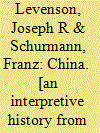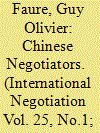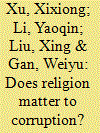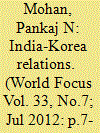| Srl | Item |
| 1 |
ID:
029722


|
|
|
|
|
| Publication |
Berkeley, University of California Press, 1969.
|
| Description |
xi, 141p.hbk
|
|
|
|
|
|
|
|
|
|
|
|
Copies: C:1/I:0,R:0,Q:0
Circulation
| Accession# | Call# | Current Location | Status | Policy | Location |
| 006072 | 951.01/LEV 006072 | Main | On Shelf | General | |
|
|
|
|
| 2 |
ID:
172311


|
|
|
|
|
| Summary/Abstract |
Since China opened to the outside world in 1978, Chinese negotiators have made considerable changes in the ways they consider negotiation, strategies to implement action, and tactics used. The underlying values of their practice have also undergone a notable evolution. However, there are dimensions which remain stable and constitute the core of what could be defined as the deep “Chineseness” of these negotiators. This essay provides insight into Chinese negotiation practice and its evolution.
|
|
|
|
|
|
|
|
|
|
|
|
|
|
|
|
| 3 |
ID:
159020


|
|
|
|
|
| Summary/Abstract |
There is a growing interest in understanding how religion affects corruption. Using provincial-level panel data from 1998 to 2009, this paper investigates the effect of religious beliefs on bureaucratic corruption in China. The empirical results show that, bureaucratic corruption is negatively associated with local religious heritage, implying that religious culture plays a positive role in restraining official's corruption since religion has influence on political preference and work ethic. We also find that the negative association between religion and corruption is weaker in provinces with stronger law enforcement, which identifies the substitution effect between religious ethic and legal supervision in curbing corruption. Our findings also reveal that, among the different religions, the anti-corruption effects of China's native religions (i.e., Taoism and Buddhism) are more significant than those of foreign religions (i.e., Christianity and Islam). These conclusions are consistent and robust to various measures of main variables and a variety of robustness checks. Given the very few studies and limited data resources in the context of China, this paper as a tentative study provides new evidences of the relationship between religion and corruption.
|
|
|
|
|
|
|
|
|
|
|
|
|
|
|
|
| 4 |
ID:
116025


|
|
|